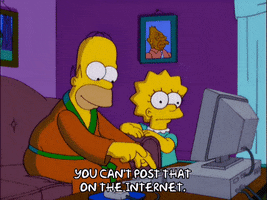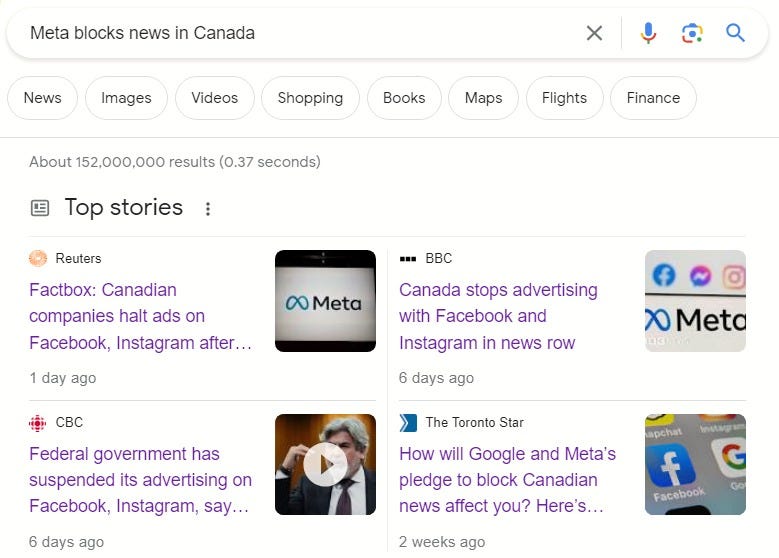Big tech blocks Canadian news
Trudeau's official census and registration of all media in Canada is at odds with Google, Meta and Microsoft.
Good news, everybody!
A few months ago, Justin Trudeau’s Liberal Party of Canada midwifed the Online Streaming Act, which grants extraordinary powers of censorship to the federal Canadian Radio-television and Telecommunications Commission [CRTC] over the Internet.
Immediately after its passage, nothing changed — the institution of the law itself didn’t change anything. We had to wait until the CRTC took up its burden of slaughtering domestic online news in Minecraft before we could see which powers would be flexed and how.
You may have read my piece on the Act, posted when we were still holding our breath on what would transpire:
What makes the Online Streaming Act — a modern update to the 1991 Broadcasting Act — difficult to understand is that it was written by the kind of boomers who got caught naked during COVID Zoom meetings. And the Act doesn’t cause immediate changes, rather it grants extraordinary powers of Internet manipulation to Canada’s broadcast regulators at the CRTC.
Probably the crux of the Act — maybe not to the government, but to regular Internet users and the companies which supply us with clickable Internet sites — is that those companies are now forced to “compensate” news groups who use foreign platforms.
But the big bad tech companies didn’t wait long to act on their warnings to Trudeau.
Last month, Meta and Google stated they’d roll out with restricting the dissemination of Canadian news in Canada — but foreign outlets, still available to Canucks, are under no such restriction.
You can still get Canadian news in Canada, but it’ll be supplied by the BBC and NPR.
So that’s Google (Google Search, possibly YouTube) and Meta (Facebook, Instagram, Threads).
Last week, an editor over at CBC attempted to look at his employer’s Instagram to find that it was blocked:
Gone were more than 6,700 posts from over several years, thousands of likes, comments and thumbnails, replaced with a message that reads, "People in Canada can't see this content. In response to Canadian government legislation, news content can't be viewed in Canada."
As I’m Googling for the facts on the topic, I’m already noticing a bias against Canadian commentary.
One paper, The Logic, recently posted an article where the headline said one thing about the actions of our tech overlords, (Microsoft’s Bing will keep showing Canadian news) but the article said the opposite.
The discrepancy was noted by Luke LeBrun over at the left wing Press Progress.
Press Progress chatted with a Trudeau-appointed Senator, who suggested we should use Microsoft’s Bing… even though Microsoft isn’t paying outlets either:
“Further to the adoption of C-18, I resent the blackmailing of Canadians by Meta and Google,” Senator Pierre Dalphond told PressProgress. The Senator added that “by switching our clicks to another search engine than Google, Canadians can force it to show respect for Canada.”
“I have chosen Bing because it is as good as Google as a search engine while it offers access to Canadian news content and its management does not try to play tough with Canada,” Senator Dalphond explained.
Fun fact about Canadian politics: Two or three times a year, the left wingers and right wingers are identically pissed off at the same news item — and it’s always, always a news item involving censorship, and it’s always, always government censorship.
The feds (and others) have decided to do away with advertising on Instagram and Facebook. Good. It’s a dangerously stupid waste of taxpayer money to normal people.
Social media addicts spending taxpayer money on advertisements on Facebook (so they can look at their phone all night and see the ads and get a hit of dopamine) are pitiable. They’re not even gambling with their own maplebucks.
So where does Canadian news go next?
Direct emailing?
Substack?
It’s hard to tell.
The CRTC has been embiggened with phenomenal, cosmic power, but until they act on it we don’t know how things will shake out.
But there’s one thing that should throw a wrench into Trudeau’s plans.
See, in Canada, we have registered journalism organizations, or RJO. That means that Justin Trudeau’s buddies get to decide who’s serving news, and who’s a calling him a communist fuck.
There are some benefits to registering your op-eds with Trudeau, including:
you are exempt from paying income tax
you may be eligible to claim the Canadian journalism refundable labour tax credit
your digital news subscribers, if applicable, may be eligible to claim the digital news subscription tax credit
The finance-side obligations are standard (open up your books, don’t accept gifts).
But the obligations?
5.16. An RJO should not be used to promote the views or objectives of any particular person or related group of persons. There are limitations on who can control an RJO and how much funding it can receive from one source.
Who the fuck wrote this open-ended piece of sensitive, censorious shit? Oh yeah, Trudeau’s buddies.
That obligation could be anything, which means it can be everything.
For your compliance, you are able to access dump trucks of money which the Liberals have put aside for their bedwarmers.
The big tech companies aren’t following that list.
Check it yourself. This article says that a Winnipeg-based outlet, ChrisD.ca, is caught in the riptide.
That website is not a “qualified Canadian journalism organization”.
Google and Meta and Microsoft are deciding who’s news, and who isn’t.
Getting yourself on that list of Big Boy News Groups offers no protection, and even the one-man shows are gonna get slammed.
I think federal aid will be poured over news groups, but not the little guys (or the disagreeable guys).
Ya know, Mark Steyn and others like him have said for nearly a decade and a half that you should not give in and use YouTube, Twitter, Facebook and so on for your website. It’s hard to convert an audience away from your Facebook if you’ve trained them to use Facebook instead of going directly to your site.
But it was too precious a pearl, too chemically satisfactory to trust in these third party providers.
St. Augustine tells us that it’s much, much easier to never start a bad habit than it is to give it up, and be tortured by memories calling you to that forbidden pleasure.1
I truly feel for the tiny outlets. They’re the local outlets that tell me all the road closures, or the single-issue blogs. They’re the best, and the hardest hit.
The rest of ya? lol
Honestly, not even the worst thing to happen on the Internet this week.
Source: I forget. St. Augustine wrote a LOT about his sinful past to the point where he practically invented autobiographies.







